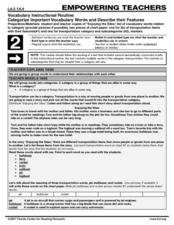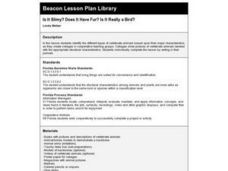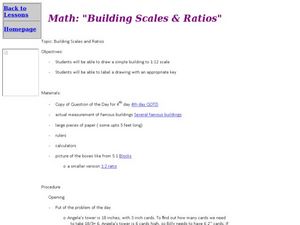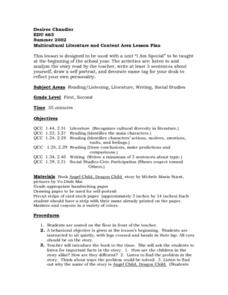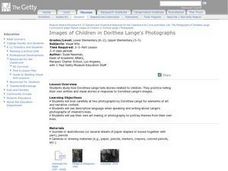Curated OER
Recognizing Our Similarities and Differences: King Day
Students discover diversity. In this service learning lesson plan, students read The Sneeches and discuss the benefits of being respectful toward one another.
Curated OER
Two Chefs
For this two chefs worksheet, students view and analyze a picture of two chefs and determine what differences there are between them. As they identify the differences they circle each one.
Curated OER
Two Birthday Cakes
In this two birthday cakes worksheet, students view and analyze a picture with two birthday cakes and determine the difference between them.
Curated OER
Categorize Important Vocabulary Words and Describe their Features
Second graders read a short passage along with the teacher to pull out various transportation related words. They analyze each of the chosen words by creating a chart which helps them think about the similarities and differences of each...
Curated OER
Introduction to Plant Science
Although the formatting is less than perfect and some of the pictures are blurry, the information in this presentation on plants is pertinent. Viewers will be able to compare and contrast plants with animals. They will learn about...
Curated OER
Everything Grows
First graders read about the growth of living things. For this similiarities and differences lesson, 1st graders list things that are similiar and different about growing plants. Students then use a graphic organizer to list the...
Curated OER
Food and Languages of the World
Students explore and notice how foods from different countries of the world are alike and different. For this food and languages of the world lesson, students examine fruit and bread from a variety of countries around the world....
Museum of Disability
Can You Hear a Rainbow?
Teach your class about compassion and empathy with Jamee Riggio Heelan's Can You Hear a Rainbow? As kids read about Chris, a boy who is deaf, they discuss the things he likes to do, as well as the ways he communicates with the world.
Curated OER
Star Wars – a Relaxation Lesson
Take young padawans on a journey towards ultimate relaxation with a series of Star Wars themed yoga poses. Following a mindful and imaginative story, the force is strong with stretches including the Rey's Pole,...
Curated OER
Classifying Vertebrates
Second graders study animal characteristics and classification. For this animal characteristics and classifications lesson, 2nd graders determine how to classify vertebrates which include mammals, reptiles, amphibians, birds, and fish....
Curated OER
Identifying Fossils
Students create model fossils. For this fossils lesson, students view pictures of fossils and compare and contrast these fossils. Students read about fossils and create a database chart with the facts they learn. ...
Curated OER
Is It Slimy? Does It Have Fur? Is It Really a Bird?
Sixth graders identify the different types of vertebrate animals based upon their major characteristics, as they create collages in groups. Collages show pictures of vertebrate animals labeled with the appropriate structural...
Curated OER
Activity Plan 3-4: Dreamy Rhymes
Learners write a story about an animal using rhyme. In this literacy lesson plan, the teacher shares different versions of "Mary Had a Little Lamb" with the class and that becomes the basis for the creation of a picture and story for...
Curated OER
Building Scales and Ratios
Students solve problems using scales and ratios. In this algebra lesson plan, students create drawings using scales of 1:12. They follow a key to help them draw different buildings using the right scales. They also complete word problems...
Curated OER
Getting in Shape Again
Learners create rocket shapes out of pattern blocks. They draw a picture of a rocket, build a pattern block rocket following simple directions, and complete a graph of the shapes used.
Curated OER
Bird Bodies
Learners read about and explore the different types of birds. They discuss how all birds are alike and what makes some different from the others. They experiment picking up "food items" using different tools that represent different...
Curated OER
"Angel Child, Dragon Child"
Students read and analyze the book "Angel Child, Dragon Child" by Michele Maria Surat. They chart the main story elements on a graphic organizer, and write three sentences about themselves and draw a self-portrait. Students then create...
Curated OER
Homonyms
In this homonyms learning exercise, students read 6 pairs of words which sound alike but are spelled differently. Students draw a picture for each that shows the meaning.
Curated OER
Images of Children in Dorthea Lange's Photographs
Students research the photographs of Dorthea Lange. In this visual art lesson plan, students look at photographs of children taken by Lange and answer several questions. They write or tell stories to explain what they think is occurring...
American Museum of Natural History
Cosmic Cookies
Scholars read about each planet then bake a plate of cosmic cookies—no-bake cookies decorated to look like the planets; Mercury, Venus, Earth, Mars, Jupiter, Saturn, Uranus, Neptune, and Pluto.
Curated OER
What Do You Know About the Birds Around You?
Students compare and contrast various species of birds. After participating in a brief discussion of the characteristics of birds, they view birds in their natural habitat and in pictures with a focus on the similarities and differences...
Curated OER
Anty-Bodies
Students compare and contrast likenesses and differences to others by creating a life-size picture of themselves. In this character building lesson, students dictate a sentence about comments on sharing and display them with their...
Curated OER
Best Nest Builders
Students construct a nest out of mud, string, sticks, and grass using only two fingers or two popsicle sticks to simulate a bird building a nest. They compare/contrast pictures of various bird nests and draw the differences between the...
Curated OER
Asha's Village
Pupils compare and contrast their own culture with an Indian girl named Asha. In this culture lesson plan, students read, look at pictures, and make inferences.





